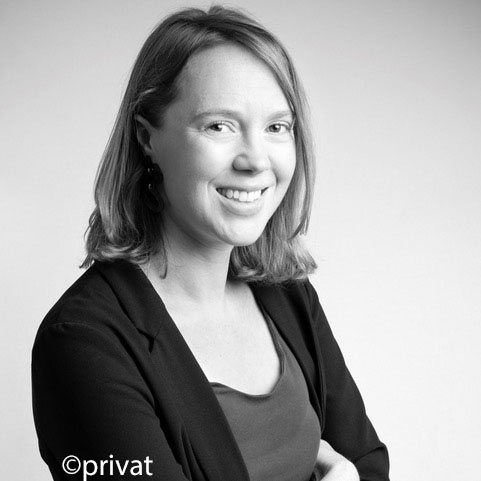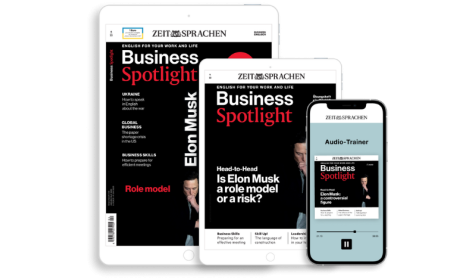Starten Sie den Audio-Text
Mit dem Audio-Player können Sie sich den Text anhören. Darunter finden Sie das Transkript.
Job interviewBewerbungs-, VorstellungsgesprächJob interviews can be nerve-rackingzermürbendnerve-racking experiences, but these tips should help you to make the most of your next job interview. Sarah Hanson, a managing partner at a professional training company called Interactifs, shared her top tips with Business Spotlight correspondent Melita Cameron-Wood over Zoom.
Melita: Hi, thanks so much for joining me. I’m really interested to hear your job interview tips. We’re particularly interested in advice that people might not have heard before. What would be your top recommendations?
Sarah: Where to start? So, two things immediately come to mind beyond the typical advice people have for interviews. The first is the idea that it’s a two-way process — to actually think about the person you want to to portray sb.jmdn. porträtieren; hier: darstellen, verkörpernportray, and what you want the other person to know about you by the end of the conversation, so starting with the end in mind.
And in fact, this is what we teach for any meeting or conversation that people go into: What do you want to leave with? What do you want the outcomeErgebnisoutcome to be? Because so often, all the effort goes into the front-end: finding the opportunity, to refine sth.verfeinern, präzisierenrefining the applicationBewerbungapplication, the cover letterBegleitschreiben; hier auch: Bewerbungsschreibencover letter and the experience, and then to wing sth.etw. improvisierenwinging the conversation to see how it goes, based on the questions that the interviewerPerson, die das Bewerbungsgespräch durchführtinterviewer has for the participant, or for the intervieweePerson, die an dem Bewerbungsgespräch teilnimmtinterviewee, rather than thinking about the impression that you make or what they need to know about you by the end of the conversation.
And importantly, the flipsideKehrseiteflipside of that: what you want to learn from them. So, that upfront, rather than at the end of the conversation, you have a chance to plant the seedSamen(korn)seed or to be more explicitausdrücklichexplicit about what you want to walk away with as well.
The second piece of advice that I typically give in these scenarios is to speak about what you can do, your current experiences, and what is transferrable from what you’re doing presently.
It’s far more engagingeinnehmendengaging in the conversation to talk about the present, because it’s more likely that those are the transferrable skills that, on one hand, the interviewer is looking for, in terms of your future potential and what you can bring to the position, but also what’s most relevant and timelyzeitgemäß, fristgerechttimely for you.
Melita: And do you have any examples of typical mistakes that you’ve seen during the interview process? Or perhaps situations that you thought could have gone better?
Sarah: In particular, where we work with consulting clients where they’re so tempted: to be ~versucht/geneigt seintempted to bring in the deck of a PowerPoint presentation — beautifully prepared, a deck of 24 or 48 slideFolieslides, talking through their context and their proposal.
We revolutionized their presentations by suggesting they start by asking, “Where do you want me to begin?” The same principle applies in interviews. Rather than being tempted to give the potted history (UK ifml.)Kurzfassung (einer Geschichte)potted history of your whole CV (curriculum vitae)LebenslaufCV, where does the interviewer want you to begin? Right at the beginning: What led you to choose the topics that you studied, the career pathway you’ve taken? Or here in the present? What led you to apply for the role? And what are you bringing from your most recent job?
Melita: And what’s the best way of navigating that salary discussion?
Sarah: People to beat round the bush (UK ifml.)um den heißen Brei herumredenbeat round the bush, go round the houses (UK)nicht direkt zur Sache kommengo round the houses. They’re not sure how to bring up that typical line on so many job adverts now: “Salary competitivewettbewerbsfähig; hier auch: marktgerechtcompetitive” or “competitive package” or “dependent on experience”?
And so often, people say, well, the interview’s the place to find out more. Yet, I imagine it’s very tempting for most people to avoid that topic until the end of the conversation. How do you to clarify sth.etw. klärenclarify what they mean by a competitive package?
So, one thing that I strongly recommend people consider and even test with people that they know well: How does it sound for them to to broach sth.etw. anschneiden, zur Sprache bringenbroach this topic? For example: “There’s a number of details I’m keen: to be ~ to do sth. (UK)etw. unbedingt tun wollenkeen to learn today, including not only your expectations of the right person — the successful person that you’re looking for — but also, I’m keen to learn more about the specifics of the starting salary, and what I can hope for in terms of a package.
Because at least you’ll know whether you’re open to continue spending your time negotiating, presenting yourself in the best possible light for the salary that’s right for you. Or you can manage expectations at the outset: at the ~am Anfang, von vornhereinoutset and give a figure or a position of what you’re looking to earn. It feels like that’s one of the last topics that too often people avoid, yet so few of us are in a position to be able to work for pure enjoyment.
Melita: Yeah, absolutely. Well, thanks so much for taking the time to talk to me. I really to appreciate sth.etw. (zu) schätzen (Wissen)appreciate it.
Sarah: Yeah, I’ve really enjoyed the conversation we’ve just had. I hope it gives you sufficient context to have a different takehier: Einstellungtake on the topic.
Melita: Yes, definitely. There’s some great advice there. Thanks again. Take care. Bye-bye.
Sarah: OK. Have a great weekend. Thanks again. Bye-bye.
Melita: Have a good one. Bye.

Sarah Hanson is a managing partner at Interactifs, a professional training company. She has trained and coached hundreds of people around the world in communication skills.
Neugierig auf mehr?
Dann nutzen Sie die Möglichkeit und stellen Sie sich Ihr optimales Abo ganz nach Ihren Wünschen zusammen.



